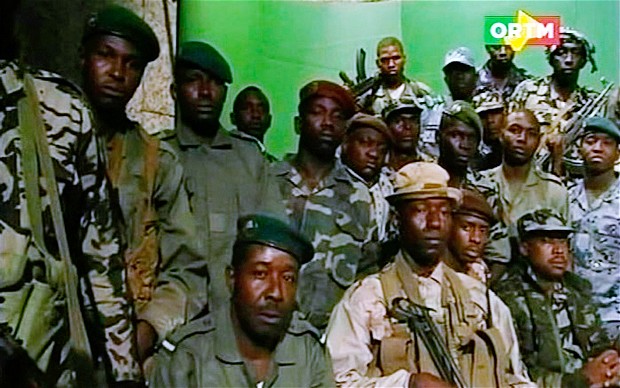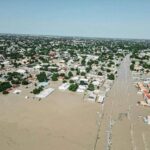Recently, a military takeover in Guinea removed “democratically elected” President Alpha Conde who was serving a controversial third term after amending the Constitution and “winning” an election marred by irregularities.
President Buhari, himself a former military dictator and coup plotter, couldn’t see the irony in his condemnation of the coup in which a young Colonel Mamaday Doumbouya anointed himself leader. There can only be two reasons why Buhari is upset. Firstly, perhaps because he is now older and wiser and can now recognise the sanctimonious claptrap spouted by errant young military officers when they betray their sworn allegiance to the constitution and their Commander-in-Chief and seize power.Secondly, perhaps because all the ills which “necessitated” the coup in Guinea exist under his leadership in Nigeria.
- Akintoye wants UN to declare Miyetti Allah terrorist group
- PODCAST: What Happens To The Various Taxes Nigerians Pay?
The coup plotters said “if you see the condition of our roads, schools and hospitals, you will realise that it’s time for us to wake up.” It goes without saying that Guinea had a Legislature, Judiciary and Executive whose members fed fat off the treasury. Yet between these three arms of government they were unable to fulfill the aspirations of the citizenry. Calls for elections to restore democracy in such countries are questionable when the nature of the Constitution, complete disregard for its provisions, an unprincipled political class and a compromised electoral body lacking integrity are a major part of the problem.
African leaders act as if democracy means simply holding elections no matter how defective. They turn themselves into “democratic monarchs” paying only lip service to issues of transparency, accountability, civic responsibility and the responsiveness of their government towards the suffering of their people. The tragedy of poor leadership in Africa is that elected presidents criticise their predecessors for something, get into office then do even worse and expect not to be questioned! They don’t see themselves serving citizens, but rather believe citizens should serve them! They are incapable of fulfilling the aspirations of their people because they are only concerned with the “legality” of their government rather than its “legitimacy”.
The mass jubilation which greeted news of the successful coup should send a chill down the spine of most African leaders. It wasn’t because the citizenry believe for one minute that military government will solve their problems, but rather because at last somebody had punished politicians who live lives of luxury at the nation’s expense while not giving a damn about their suffering.
Similar to most elected Africa leaders, Conde jailed critics without trial in the name of “national security”, exhibited complete disregard for human rights, intolerance for opposition, contempt for the constraints imposed by the constitution, and acceptance of corruption by his supporters. Under his watch politicians used the paraphernalia of office to better their own welfare and shrugged in indifference to the suffering of the majority of their citizens. He surrounded himself with sycophants who told him that he was the only one who could lead the country. They have been proved wrong! The use of the security apparatus to remain in power and suppress legitimate dissent means that military coups or revolution is the only way to remove incompetent, sit-tight leaders and their cronies. The coup plotters said they acted in order to end rampant corruption, disregard for human rights, and economic mismanagement under the geriatric 83-years old President.
History teaches us that while every coup leader sanctimoniously says ending ongoing corruption and maladministration is their main motivation, the most corrupt and thieving leaders in Africa have been military dictators like Mobutu Sese Seko, Samule Doe, Idi Amin Dada, Jean Bokassa, and Sani Abacha to name but a few, who mindlessly looted their treasuries after forcing themselves on their people. Military officers who mistakenly feel they are somehow qualified to run a nation have serially revealed their complete ineptness and incompetence. They promise progress but deliver exactly the opposite only succeeding in doing irreparable damage to the soul, prosperity and integrity of their country. In 2014, the African Union Peace and Security Council (AUPSC) noted that military coups originate from deficiencies in democratic governance. They said they are caused by politicians’ greed selfishness, mismanagement of diversity, failure to seize opportunities, marginalisation, human rights violations, unwillingness to accept free and fair elections, manipulations or revisions of the constitution to serve narrow interests, and corruption.
It used to be said that the worst civilian government is better than the best military government, but this is no longer the case especially now that former despots are allowed to contest for political office. Despite the monumental failures of military governance, former military dictators are rebranded and served back up to the people as “born again democrats”. Just as leopards cannot change their spots, they cannot change their way of thinking or belief that repression and coercion are the solutions to their nation’s problems. There is little doubt that Nigeria’s current leadership problems are exacerbated by the re-cycling of former military dictators who were intolerant of opposition, detained critics and presided over inept, misguided pseudo-nationalist economic policies which only worsened the situation, and killed the economy. Once elected, they act in the same manner and history merely repeats itself.
Africa, a continent noted for its immense natural wealth and potential, has serially failed to achieve any sort of notable progress in socio-economic transformation after 60 years of self-rule. This is the end result of bad leadership by a series of theiving sit-tight military despots and civilian kleptocrats! The irony is that the agitations for independence and self-government were based upon ideals of freedom, equality, good governance and an end to the injustice of enforced colonial rule. It is true that the biggest lesson learnt from studying history, is that people don’t learn lessons from history and, therefore, it keeps repeating itself!

 Join Daily Trust WhatsApp Community For Quick Access To News and Happenings Around You.
Join Daily Trust WhatsApp Community For Quick Access To News and Happenings Around You.


